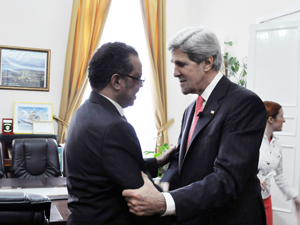
If you go to the State Departments website and view the transcript of Secretary of State John Kerry’s OAU/AU Summit remarks in Addis Ababa you’d think the speech went off without a hitch. Nothing could be further from the truth.
According to Testanews.com, “Just like what happened to his predecessor Hillary Clinton, the electric power has just gone off before his planned speech that later forced him to cut short his trip and leave the country (Ethiopia).” Like Clinton, the interruption caused him to depart the summit earlier than planned.
The Washington Post had a slightly different take. Kerry’s speech during the banquet was cancelled, but then moved to “a separate closed-door dinner.”

There’s more. Daniel Finnan, from Radio France Internationale reported that the blackout also left President Francois Hollande of France without an audience.
There were also complaints civil society groups and diplomatic partners–including the United Nations and European Union, were banned from attending the summit.
Nkosazana Dlamini-Zuma, chair of the African Union Commission, said the decision to exclude these groups “was a direct response to these fringe meetings, which are felt to distract leaders and ministers from the summit agenda,” reported The Guardian.
“Closed sessions are closed sessions,” said Dlamini-Zuma. “We decide which ones are closed … we decide which sessions are open. And if you are not going to be participating in the discussion why do you want to be here?”
An interesting note is the fact that even though the AU gave prior notice, these groups still showed up expecting all-access.
Might have some of the expectations have been tied to assumed privileges that come with being donors to the AU? According to the May 17 edition of African News, reporting on the OAU/AU summit that began on May 25, “This would be the first time in the 50-year history of the AU-Organization of African Unity that these parties will be excluded from discussion by the 54-member-state regional union.”
Dlamini-Zuma said, “We have to be allowed to do our work in an efficient way.” She cited the EU, which has a policy of not allowing observers at its meetings. Anton du Plessis, deputy executive director of the Institute for Security Studies, a think tank, told The Guardian that the EU is not analogous “as the European body’s foreign partners do not fund 97 percent of its program budget–as is the case with the AU.”
The Guardian painted the picture that confusion at the summit was a result of groups being given too short a notice.
The theme of this 50th Anniversary summit was “Pan Africanism & African Renaissance.”
ISS senior researcher Solomon Dersso thinks the move helped the AU. “The assembly discussions looked very focused and they seem to have made some very interesting decisions,” he said. The Guardian reported, “African diplomats agreed, saying they were better able to apply themselves to their work.”
That work included a resolution the AU adopted “by consensus” condemning the International Criminal Court (ICC) for disproportionately indicting African leaders.
Ethiopian Prime Minister Hailemariam Desalegn, who chairs the AU, charged the ICC with operating a kind of “racial (witch) hunt.”
He said African leaders are concerned that out of those indicted by the ICC, 99 percent are Africans. He said during the last day of the summit, “This shows something is flawed within the system of the ICC and we object to that.”
Noting the current ICC indictments against recently elected Kenyan President Uhuru Kenyatta and his deputy William Ruto, Desalegn said, both cases should be referred to the Kenyan courts.
He accuses the ICC of “chasing” Kenyatta and Ruto, despite the rivalry between the Kalenjin and Kikuyu ethnic groups being resolved. The indictment accuses both men of initiating violence that preceded the 2007 elections.
In addition, the AU believes it unreasonable for the UN Security Council to refer Sudan President Omar Bashir to the ICC when “three of its five permanent members–the United States, Russia and China–had either not signed up to or not ratified the Rome Statute which established the ICC,” said AU Peace and Security Council head Ramtane Lamamra, Reuters news agency reported.
Whether or not Secretary Kerry was able to finally give his speech at the AU summit is debatable and is its value. The transcript from the State Department website has, in the context of the AU theme of Pan Africanism, only one sentence worthy of reprinting, and it didn’t belong to Kerry.
It was the proverb, “If you want to go quickly, go alone. But if you want to go far, go together.” Hopefully this marks the beginning of a unified AU, where shared African interests always, regardless of the funding sources, reign supreme.
Jehron Muhammad, who writes from Philadelphia, can be reached at [email protected]












